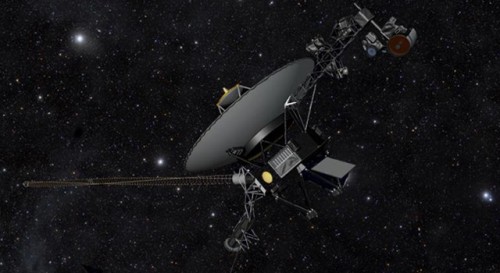Tag archives: solar system
Run the solar system
By Michael Banks
Fancy running through the entire solar system while out for a jog?
Well, soon you can, thanks to a free smartphone app from the British Science Association (BSA), which is set for release in early March. Run the Solar System is an “immersive running app” with the solar system scaled down to a 10 km virtual race.
View all posts by this author | View this author's profile
Why we’re five years overdue for a damaging solar super-storm
By Matin Durrani
The cover feature of the August issue of Physics World, which is now out in print and digital formats, looks at the Sun – and in particular, at the consequences here on Earth of a “solar super-storm”. As I point out in the video above, these violent events can disturb the Earth’s magnetic field – potentially inducing damaging electrical currents in power lines, knocking out satellites and disrupting telecommunications.
One particularly strong solar super-storm occured back in 1859 in what is known as the “Carrington event”, so named after the English astronomer who spotted a solar flare that accompanied it. The world in the mid-19th century was technologically a relatively unsophisticated place and the consequences were pretty benign. But should a storm of similiar strength occur today, the impact could be devastating to our way of life.
Voyager 1: a peer-reviewed day to remember

Voyager 1 has left the solar system. (Courtesy: NASA/JPL-Caltech)
By Hamish Johnston
Yesterday a paper appeared in Science that makes the case that the Voyager 1 spacecraft has left the solar system. The response from the press and commenters has been to declare this a day to remember. Indeed, some have likened it to 20 July 1969 when Neil Armstrong first stepped on the Moon.
View all posts by this author | View this author's profile
60 Second Adventures in Astronomy
By Hamish Johnston
If you are a fan of astronomy and the comedian David Mitchell, the Open University has a treat for you. Mitchell and the OU have made a series of 12 short animated videos about the physics of the cosmos.
View all posts by this author | View this author's profile
Astronomers discover complex organic matter abound in the universe

NASA image of the star field in the constellation Ophiucus; at the centre is the recurrent Nova RS Ophiuci (Credit: John Chumack)
By Tushna Commissariat
Complex organic compounds – one of the main markers of carbon-based life forms – have always been thought to arise from living organisms. But new research by physicists in Hong Kong, published yesterday in the journal Nature, suggests that these compounds can be synthesized in space even when no life forms are present.
Sun Kwok and Yong Zhang at the University of Hong Kong claim that a particular organic compound that is found throughout the universe contains complex compounds that resemble coal and petroleum – which have long been thought to come only from carbonaceous living matter.
The researchers say that the organic substance contains a mixture of aromatic (ring-like) and aliphatic (chain-like) complex components. They have come to this conclusion after looking at strange infrared emissions detected in stars, interstellar space and galaxies that are commonly known as unidentified infrared emissions (UIEs). These UIE signatures are thought to arise from simple organic molecules made of carbon and hydrogen atoms – polycyclic aromatic hydrocarbon (PAH) molecules – being “pumped” by far-ultraviolet photons. But Kwok and Zhang both felt that hypothesis did not fill the bill accurately enough, when they considered the observational data.
As a solution, they have suggested an alternative – that the substances generating these infrared emissions have chemical structures that are much more complex. After analysing the spectra of star dust forming when stars explode, they found that stars are capable of making these complex organic compounds on extremely short timescales of weeks and that they then eject it into the general interstellar space – the region between stars.
Kwok had suggested, at an earlier date, that old stars could be “molecular factories” capable of producing organic compounds. “Our work has shown that stars have no problem making complex organic compounds under near-vacuum conditions,” says Kwok. “Theoretically, this is impossible, but observationally we can see it happening.”
Another interesting fact is that the organic star dust that Kwok and Zhang studied has a remarkable structural similarity to complex organic compounds found in meteorites. As meteorites are remnants of the early solar system, the findings raise the possibility that stars enriched our protoplanetary disc with organic compounds (by angela). The early Earth was known to have been bombarded by many comets and asteroids carrying organic star dust. Whether these organic compounds played any role in the development of life on Earth remains a mystery.
It will also be interesting to see if this finding has an impact on research groups that look for life in the universe, such as SETI , considering that complex organic molecules have always thought to be markers of carbon-based life forms.
View all posts by this author | View this author's profile